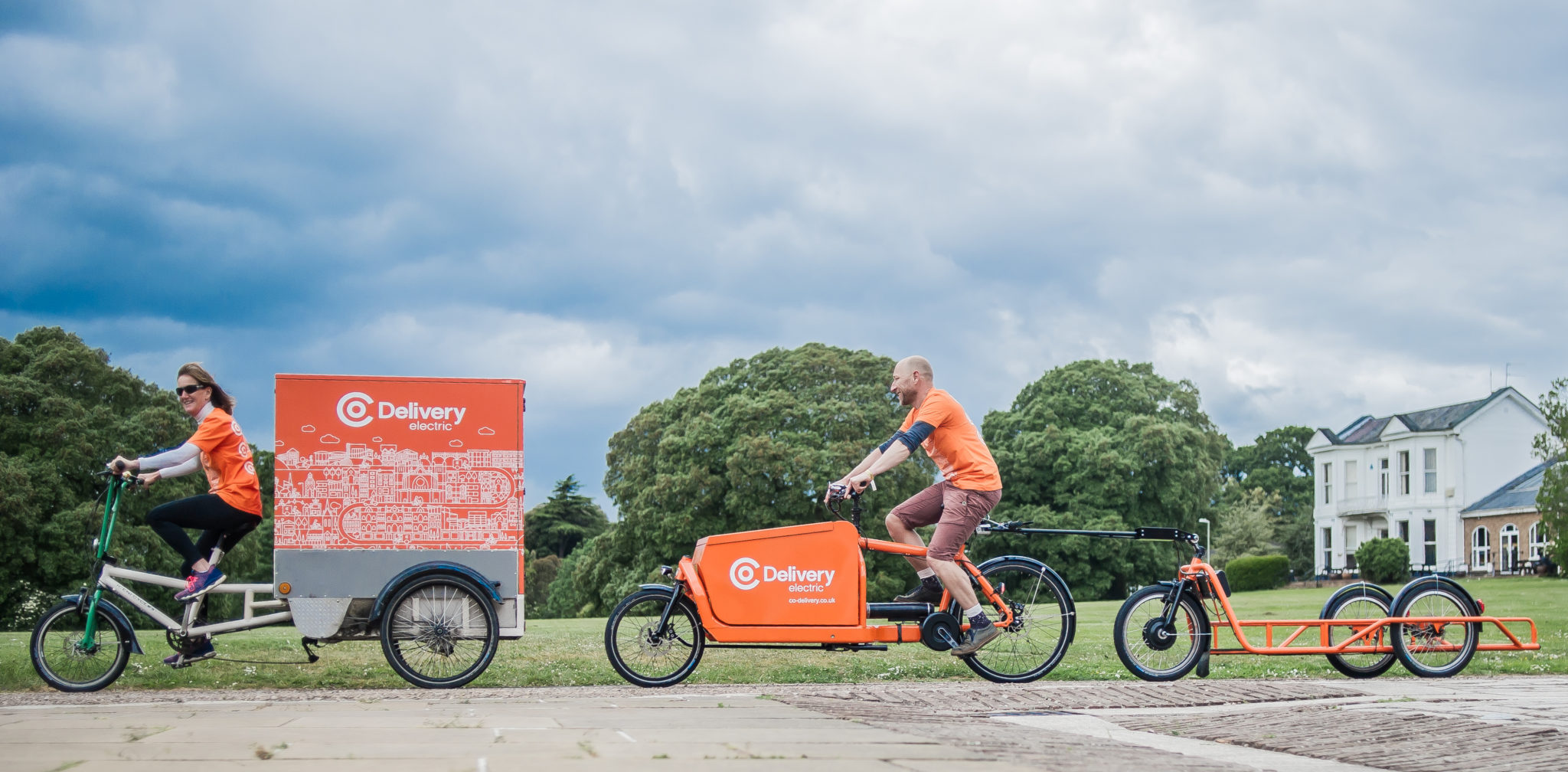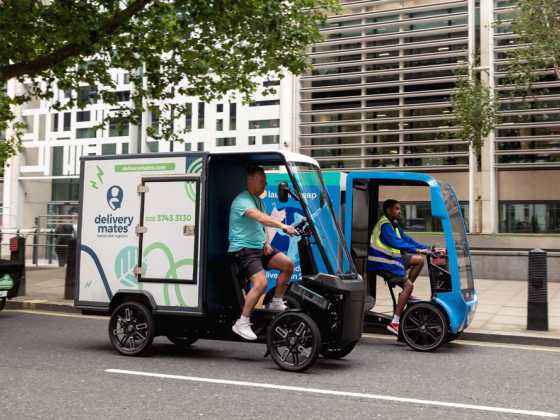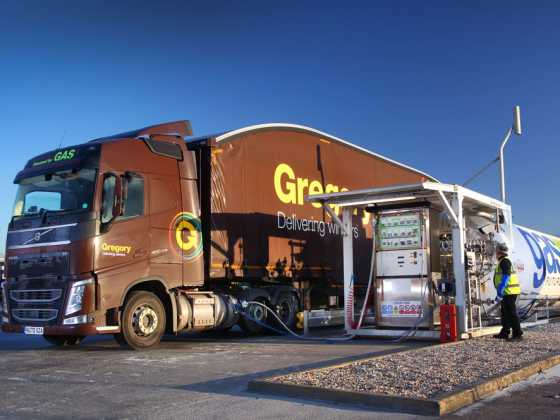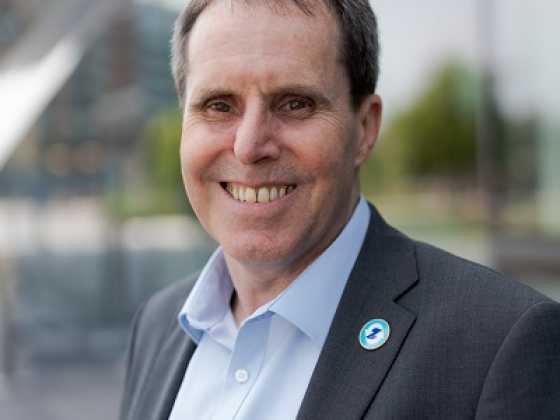E-cargo bikes for local authorities

Eighteen local authorities in England have secured funding from the Department for Transport’s £2m eCargo Bike Grant Fund, which will enable them to purchase e-cargo bikes for either local businesses or for use within their own fleets
The Department for Transport’s £2m eCargo Bike Grant Fund was established to help councils and companies to replace their polluting vans with ecargo bikes.
Eighteen local authorities in England have secured the funding, which will enable them to purchase ecargo bikes for either local business use or for use within their own fleets.
One of the successful applicants was Cambridgeshire County Council, who plans to deploy 30 e-cargo bikes across four initiatives in Cambridge. These cover first mile deliveries, a residential sharing scheme, a ‘try before you buy’ leasing scheme and pool e-cargo bikes.
Devon County Council’s work will encourage the uptake of e-cargo bikes across partner organisations to support sustainable active business travel as an alternative to car and van use. Thirteen ecargo bikes will be used to support Exeter’s ambition for net zero service with two of the total used by the local hospital’s adult and social care teams to help care for the most isolated people in the city. Four bikes will be used to expand the eCargo Co Delivery courier service in Exeter (pictured above) – enabling more businesses to deliver goods across the city.
Brighton & Hove City Council has been awarded over £85,000 for 12 new eCargo bikes for the city. One of the bikes will be given to the council’s postal team while another will go to City Parks. Five will go to courier company Zedify to support business deliveries across the city and the remaining bikes will be used by five city businesses, including Gunns Florist, Brighton and Hove Energy Services Co-op (BHESCo), Real Patisserie, Brighton Gin and Mittens Plumbing, Heating and Bathroom Design.
Dan Curtis from BHESCo said: “Using an eCargo bike will have a huge impact on the number of households that BHESCo can help through our fuel poverty alleviation programme.
“Currently, we have to visit each property twice; once for a survey to identify the improvements we can make, and then again to install the energy saving measures that we have chosen.
“By using an eCargo bike, we can complete the whole process in a single visit, which means we will be able to support double the number of households at risk of cold homes and fuel poverty in our city.”
Tim Anderson, Head of Transport at Energy Saving Trust, said: “It is exciting to see the strength and breadth of applications supported by the eCargo Bike Grant Fund. We received 58 applications and the 18 local authorities who have been successful in securing funding offered compelling cases for ecargo bikes across a range of activity. These projects will purchase a total of 273 ecargo bikes and nine ecargo bike trailers, enabling more businesses to benefit from access. A further 409 ecargo bikes have been grant funded direct to 146 organisations through the national element of the programme.
“E-Cargo bikes are an attractive low carbon transport solution that are becoming more widely adopted. They offer significant benefits, most impressively fuel cost savings and contributing to improved local air quality which are particularly attractive as we work towards a green recovery following the Covid-19 outbreak. With more deliveries to our homes than ever, last mile delivery is an important area for consideration in our journey to reduce transport emissions to net zero by 2050. We expect the eCargo Bike Grant Fund to support wider and longer term uptake of these light vehicles.”
Chris Heaton-Harris, Cycling Minister, said: “E-Cargo bikes are great for not only business but also the environment, helping to lower costs and emissions.
“This funding will see groceries and other shopping delivered to people’s doors by bike instead of vans, helping ensure that as transport increases and we recover from Covid-19, it’ll be cleaner and greener than ever before.”
The eighteen councils that received funding are: Bath and North East Somerset Council; Bedford Borough Council; Birmingham City Council; Brighton and Hove City Council; Cambridgeshire County Council; Colchester Borough Council; Derby City Council; Devon County Council; Harlow and Gilston Garden Town; London Borough of Richmond; London Borough of Wandsworth; Milton Keynes Council; North Tyneside Council; Nottingham City Council; Plymouth City Council; Sheffield City Council; Southampton City Council; and Wirral Council.
What is the eCargo Bike Fund?
Funded by the Department for Transport and delivered by the Energy Saving Trust, the £2 million eCargo Bike Grant Fund was established to help improve the environment and reduce congestion.
Local authorities could bid for up to £200,00 to purchase ecargo bikes in their area for use by local businesses or within their own fleets.
The scheme was also available for limited companies, where they could apply to receive 20% off the total cost of an ecargo bike, up to a maximum of £1,000 per bike for a maximum of 200 ecargo bikes.
To be eligible for funding, an e-cargo bike must have minimum 125 litre cargo volume capacity and minimum 130 kg weight capacity (combined rider and cargo weight).
Private enterprises
Peloton Liverpool is a social enterprise that aims to deliver a better cycling experience to all through skills development programmes. Before applying for the eCargo Bike Grant Fund, Peloton already used e-cargo bikes for their own deliveries and cargo. Their goal was to offer B2B deliveries and lease out ecargo bikes to other social enterprises and individuals through a project called Agile.
As well as using ecargo bikes for their own deliveries, Peloton strives to help other organisations and individuals access them and reduce their own carbon footprint. The idea for Agile sprung from another project that involved training young men in contact with the criminal justice system, to fix bikes, and attend community events on ecargo bikes to deliver this service. This developed into an aspiration for having a fleet of e-cargo bikes.
Daniel Robinson, Operations Director at Peloton Liverpool, said: “Agile is still in its infancy, but the arrival of two ecargo bikes supported by the eCargo Bike Grant Fund has enabled us to extend our offer geographically.” Peloton is now planning to station several ecargo bikes across Liverpool for ease of use and greater coverage. Other than the eCargo Bike Grant Fund, no other funding was accessed.
Peloton is now working with Liverpool’s John Moores University to produce a report on the emissions reduced as a result of their ecargo bikes, but what feedback has been received thus far from organisations accessing Agile hasbeen overwhelmingly positive.
Ride Clean is a mobile bike cleaning and maintenance service operating in London, delivering its services to offices, cycling hubs, cafes and houses.The company was created in 2017, designed around using cargo bikes as the main form of transport. Initially, mechanical bikes were used to test the viability of the business. Having used these for four months, the organisation made the transition to ebikes to increase reach and efficiency.
Founder Katy Miller knew that she wanted bikes to be at the heart of the business. Before accessing the grant fund, Ride Clean had previously invested in one ecargo bike, and through receiving funding from the eCargo Bike Grant Fund, they were able to expand their fleet. Riders needed to be able to carry the necessary cleaning and maintenance tools, as well as travel across London without the burden of parking, congestion charges and Ultra Low Emission Zone charges. E-Cargo Bikes were the perfect solution as they have the added capacity to carry equipment, an electric motor to assist riders and are exempt from emission zone and congestion charges.
The key message received by small businesses, Miller believes, is that there is financial support available for businesses looking to invest in green technology. E-cargo bikes will give Ride Clean a greater geographical range to operate withinand continue to do their work successfully.






